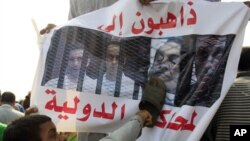Egypt's ousted President Hosni Mubarak returned to court Monday for a third hearing in his trial on charges of corruption and complicity in the killing of protesters during the 18-day-uprising that toppled him.
Mubarak opponents pelted riot police with stones and tore down metal barriers outside the police academy where the former president's trial was being held. Police later charged the crowd of mostly young men to push them away from the building.
Mr. Mubarak was wheeled into the courtroom on a stretcher as he had been during the previous two sessions. Proceedings were not televised and journalists at the court say they were not allowed to take their mobile phones inside.
In the courtroom, relatives of people killed during the January revolution taunted the president's lawyers with catcalls and occasionally attacked them with water bottles. Mohammed Bakri, who attended the session, describes the scene:
There were fist-fights and people throwing bottles of water at each other, he says. The crowd was so thick, he adds, that many lawyers left the room for fear of being injured. Police were not able to stop the scuffles, and he says he wonders how trouble-makers got into the courtroom since everyone was searched closely.
Veteran Egyptian editor and publisher Hisham Kassem says that despite the theatrics at the court, the proceedings are moving forward:
"I think the mood is upbeat. Again, one fears that Mubarak might not show up once the cameras are taken away. But, that's clearly not the case. Mubarak is in the cage, and the judge is making a huge effort to observe due process. So, I think the trial is going all the way to the end," Kassen says.
The former Egyptian president has pleaded not guilty to charges he ordered the killing of nearly 850 protesters during the uprising that forced him out in February after nearly 30 years in power.
Mr. Mubarak and his two sons, Alaa and Gamal, also face charges of corruption.
Former Interior Minister Habib al Adly and six subordinates are being tried alongside the former president over responsibility in the killings of protesters. Adly reportedly has asked the judge to be tried separately.




